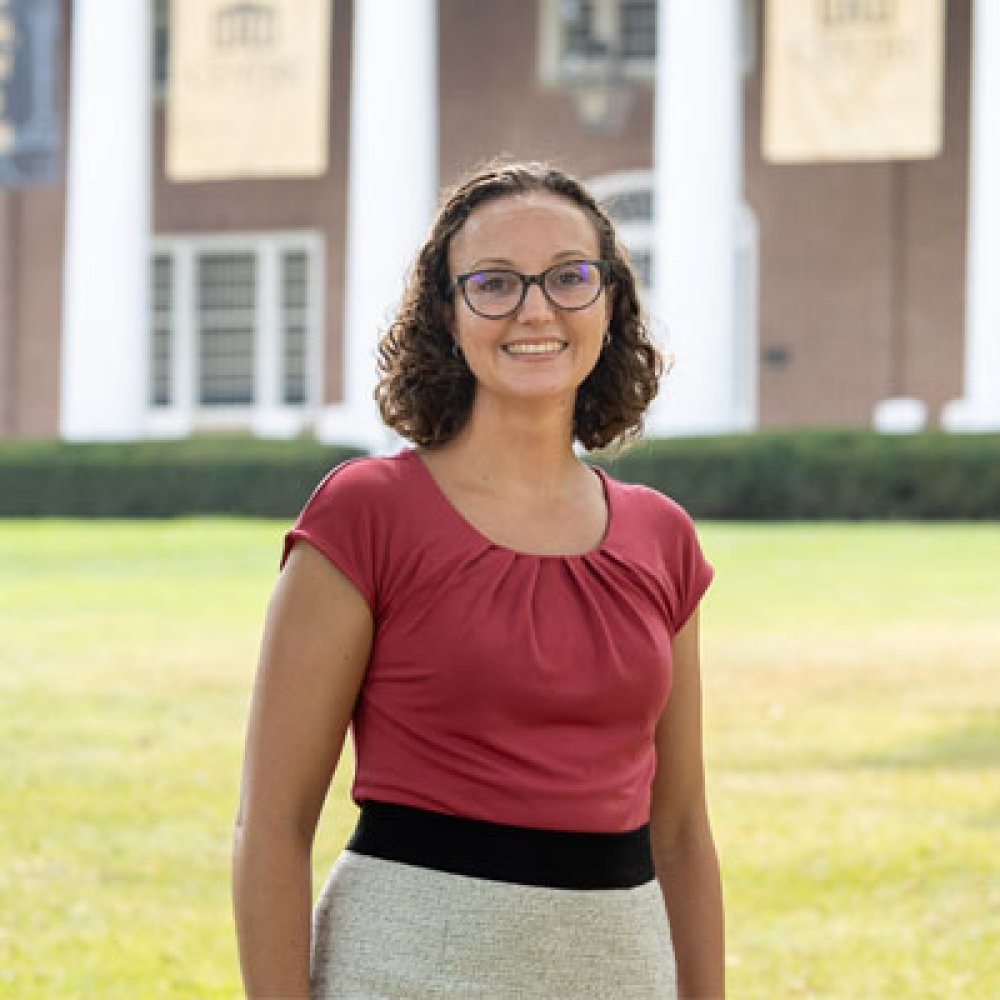
Karin (Kari) Young
H.W. Stodghill, Jr. and Adele H. Stodghill Associate Professor of Chemistry
Pre-Med Advisor
Offices & Programs
Education
BA Chemistry and English, The University of Tulsa
MS Chemistry, Yale University
PhD Inorganic Chemistry, Yale University
BIOGRAPHY
Karin (Kari) Young joined the faculty at Centre College in 2013 as an assistant professor of chemistry, and was awarded tenure and promotion to associate professor in 2019. She was named a Centre Scholar in 2016. In 2021, she received a Kirk Award for excellence in teaching. In 2022, she was named the H.W. Stodghill, Jr. and Adele H. Stodghill professor of chemistry.
Young teaches courses in general chemistry and inorganic chemistry. Her experiences in the classroom provide inspiration for research projects in the scholarship of teaching and learning. For example, Young studied how providing her inorganic chemistry students with a “test blueprint” could increase instructor-student communication and decrease test anxiety.
She is also particularly interested in developing meaningful laboratory experiences to engage students. Together with professors from across the Associated Colleges of the South, Young developed and published a new lab experiment in which students worked together to prepare and evaluate a series of silver coordination complexes as antibacterial additives for dental implants. The experiment showcases the interdisciplinary nature of science in that students get to practice inorganic synthesis and microbiology techniques as part of the same experiment.
With Professor Leonard Demoranville, Young has also worked to develop societally relevant lab experiments for Accelerated General Chemistry. Students who engage in these activities report that they are more aware of scientific contributions to social issues like climate change, kidney stones, and recycling.
One of Young’s signature courses is Alternative Energy Technology, which stems from her graduate work on artificial photosynthesis for solar energy applications. Students survey nuclear, hydroelectric, wind, solar, and bioenergy as alternatives to fossil fuels in hopes of finding the ideal energy source for the future. Along the way, students engage in hands-on activities like building wind turbine blades and powering solar cells with fruit.
In the research laboratory, Young and her undergraduate research students are working toward the preparation heterobimetallic complexes that include both aluminum and platinum ions. Platinum and aluminum are both metals, but from a chemist’s perspective, they have extremely different properties (and prices!) The goal of this work is to combine the electron-withdrawing properties of inexpensive aluminum with the catalytic properties of expensive platinum-group metals to develop new families of tunable catalysts. Students who engage in this work will learn chemical synthesis and nuclear magnetic resonance (NMR) spectroscopy in order to understand how changes in one part of the complex are communicated at the molecular level to another part of the complex. This work is completed in collaboration with Professor Tim Brewster from the University of Memphis.
Young also advises students interested in health professions, especially medical school. She also coordinates the Summer Health Immersion Program, a summer enrichment program for incoming Centre students from Kentucky. This program is funded by the Kentucky Council on Postsecondary Education.
Originally from Texas, Young graduated magna cum laude from the University of Tulsa with a B.A. in chemistry and English, where she was elected to Phi Beta Kappa. She subsequently earned an M.S. in chemistry and a Ph.D. in inorganic chemistry from Yale University, advised by Professor Gary W. Brudvig.
AWARDS/GRANTS
- Kirk Award for Excellence in Teaching 2021
- VIPER Fellow 2018-2020
- Centre Scholar Award, Centre College 2016-2018
- NIH Biophysical Training Grant, Yale University 2010-2011
- Iota Sigma Pi Undergraduate Excellence Award 2008
PROFESSIONAL AFFILIATIONS/MEMBERSHIPS
- American Chemical Society
- Interactive Online Network of Inorganic Chemists (www.IONiCVIPEr.org)
- National Association of Advisors in the Health Professions
- Phi Beta Kappa, Beta Chapter of Oklahoma, 2007
COURSES TAUGHT
- CHE 132: General Chemistry II
- CHE 135: Accelerated General Chemistry
- CHE 332: Inorganic Chemistry
- ENS 240: Alternative Energy Technology
PUBLICATIONS
- “Donor Ability of Bisphosphinemonoxide Ligands Relevant to Late-Metal Olefin Polymerization Catalysis.” Natalie S. Taylor, Maxwell T. Gordinier '23, Tejaskumar Suhagia, Danna D. Pinto, Demetrius D. Cherry, Dominic S. Verry '25, Lindsay N. Baker, Nathan J. DeYonker, Karin J. Young, Timothy P. Brewster. (2024). Inorg. Chem. 63, 2888–2898.
- “Adding a Greenhouse Gas Module to a Molecular Modeling Activity in General Chemistry” Leonard T. Demoranville, Jeffrey E. Fieberg, Susan Campbell, Olivia R. Kane '18, Erin Wachter, Karin J. Young. (2023). J. Chem. Educ. 100, 2473-2477.
- Synthesis, Antimicrobial Properties, and Biomedical Applicability of Ag (I) Cyanoximate Complexes Karin J. Young., Laurel G. Habgood, Kristina L. Stensaas, Omar Villanueva, Willis Weigand; (2021) J. Chem. Educ. 98, 2999-3003
- StayCentred: Maintaining Personal Education at Centre College During COVID-19 Kristen D. Fulfer. Erin Wacher, Jennifer L. Muzyka, Leonard T. Demoranville, Jeffrey E. Fieberg, January D. Haile, Daniel Scott, Yang Song, Jose M. Workman, Karin J. Young. (2020) J. Chem. Educ. 97, 2783-2787.
- Effect of an Application-Based Laboratory Curriculum on Student Understanding of Societal Impact of Chemistry in an Accelerated General Chemistry Course Leonard T. Demoranville, Olivia R. Kane '18, and Karin J. Young. (2020) J. Chem. Educ. 97, 66-71
- Influence of Exam Blueprint Distribution on Student Perceptions and Performance in an Inorganic Chemistry Course. Karin J. Young, Sarah Lashley, Sarah Murray. (2019) J. Chem. Educ. 96, 2141-2148.
